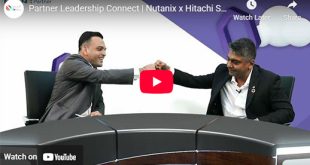IT Security company Sophos has evolved a strategy to strengthen its market presence in Indian Mid market, and pragmatic enterprise to achieve 40% market share in next three to four years. The move will enable Sophos to further consolidate its position in the Indian Cyber Security industry. In an exclusive interaction with Kris Hagerman, CEO, Sophos and Kuldeep Raina, Country Manager, India and SAARC, itVARnews finds out the company’s vision and strategy for 2015.
- What are the strategies you have developed for Indian market?
Kris Hagerman: We think India as a market is one of the most significant opportunities anywhere in the world. We also think Indian market alliance suits perfectly with our strategy and vision as a company. The second thing is that because of our partnership with Cyberoam, we now have a significant say in terms of resources to grow India business.
We now have over 500 people in Ahmadabad and we are just about to open another office in April, with 320 more people. The capability that we have in India covers every function – engineering, sales, sales engineering, support, marketing etc., it is becoming a key pillar of the entire Sophos operation. For us India is going to continue to be real source of investment and focus.
The strategy of Sophos is uniquely aligned with India because the core mission of Sophos is very simple to be the best in the world at delivering simple, integrated complete security for small and mid market enterprises and what we call Pragmatic Enterprises and the channel.
We think that philosophy and vision is perfectly aligned with the Indian market because of our emphasis on ‘security made simple’; meaning we take world class product capability in end point, mobile, server, encryption, network – in all these different components. We integrate them and deliver in a way that an IT administrator can manage. That is very different from the vast majority of other leading security players.
We are betting the entire company on the cloud and are the only company in the industry that is delivering a single cloud based management console for entire product portfolio. We are a channel first company and go to market exclusively with our channel partners. 100 percent of our business goes through channels.
- How do you appoint channel partners?
Kris Hagerman: The fundamental difference is that we do not sell directly to end users. We work with our channel partners and they are of a variety of different profiles. Some of them focus on smaller companies, some on schools, while some on a particular vertical like healthcare, pharmaceutical or government. Some even focus on higher end mid market and pragmatic enterprises. We have over two lakh customers around the world. Some of them are very large enterprises and our channel partners cater to them.
- Which are the potential verticals in India?
Kris Hagerman: It is completely horizontal. We have solutions that cut across every vertical, since today, cyber criminals are targeting every vertical.
Kuldeep Raina: Finance is the biggest vertical for us. We have more revenue coming from BFSI in India and have got largest number of seats in data protection. In addition, manufacturing is giving us 12% business from India. Looking at from the security angle we see significant dominance in BFSI and next vertical is Government. The top two verticals is manufacturing and BFSI.
- Which are the potential cities for Sophos?
Kuldeep Raina: Mumbai and South India as they contribute lot of mid market, which is a bigger base for us and is picking up very well. Sri Lanka is also the part of the South market and we have good market share and leading the market share in security there. Top banks and Telcos are my customers in Sri Lanka. In two and a half years of having a presence here, top 10 banks are using our solutions from both end point, encryption and end point security as well.
- What are your latest offerings in Network Security? How do you think they stand up to competition?
Kris Hagerman: On the Network Security front, we are very fortunate because partnering with Cyberoam we now have over 350 engineers exclusively focus on delivering world-class network security products. Key leaders in that market are Fortinet, Palo Alto, Checkpoint, Cisco, Sonicwall and Sophos. We are fortunate that we are growing at about twice the rate of the market in end user security as well as in network security. Sophos today is an over USD 450 million company. In terms of technology in network security, the innovations fundamentally settle down in two things like performance, security effectiveness and being able to incorporate advance, innovative technologies to identify zero day attacks. We are the only company to manage end point security along with UTM.
The most significant differentiating factor of our technology roadmap in network security is our ability to integrate between the network and the end point.
- For Sophos standalone security is better or a threat mitigation platform? What is your strategy?
Kris Hagerman: Our focus and drive is to put our customers in position when they do not have to choose. We are very fortunate in that and are in the Gartner leadership quadrant in endpoint, UTM, encryption and every major product that we deliver. If we do not have any product, we are on a path to get that to the portfolio. Each product in our portfolio constantly gets better.
- Apart from APT, what do you think ails the mid market segment in Indian enterprise?
Kris Hagerman: The fundamental challenge for mid market enterprises is that they face a threat landscape which is identical to the largest enterprises in the world, but they have a fraction of the resources and the staff trained to deal with it. They don’t have any workforce or resources that a very large enterprise has. Our mission as a company is to deliver world-class industrial strength security to organizations that do not have enterprise class security budgets or staffs, since that is the fundamental problem of mid market company. We are building solutions that are easy to understand and easy to manage even by the IT manager or somebody who does not have knowledge of security.
- Do policies help in mitigation? Do you think increasing surprise attacks need policies or something stronger?
Kris Hagerman: Of course, any enterprise will have policies, guidelines for security but it has just started. Companies should have the right guidelines and policies, which is very important along with the right technologies and policies to put in place. You need to be able to deploy and manage them, keep them updated and maintained because with 400,000 malware attacks a day, tools become useless within hours.
 Latest Technology News Today – Get Latest Information Technology Updates and Services Latest Technology News Today – Get Latest Information Technology Updates and Services
Latest Technology News Today – Get Latest Information Technology Updates and Services Latest Technology News Today – Get Latest Information Technology Updates and Services 









